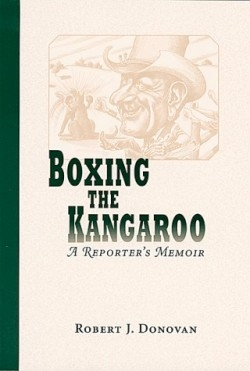Boxing the Kangaroo
A Reporter's Memoir
In 1966, President Johnson embarked on an Asian trip to seek support for his Vietnam policies. Donovan, who covered the mission as Washington Bureau Chief for the Los Angeles Times, was volunteered by Johnson to box a kangaroo while the entourage was in Australia. Johnson, as will come as no surprise to those who remember his touchy relations with the media, cheered on the kangaroo. Donavan soon discovered that this particular roo was a pusher, not a puncher. The bout ended when Donovan lightly touched his opponent’s nose and declared himself the winner. He and the six-foot marsupial parted on amicable terms. The diplomacy and the good understanding of the situation that made Donovan a winning kangaroo boxer also made him a highly regarded journalist and author.
Donovan, now eighty-eight, presents a collection of entertaining and memorable stories that describe his long career, which began during the Depression in 1932 when attending Yale was not possible. From 1933-38 he worked for the Buffalo Courier Express, starting as a $7.00 a week copyboy and then eventually being promoted to reporter at twice the salary. After leaving the Express, Donovan became the City Hall reporter for the New York Herald Tribune, where he covered the legendary, progressive mayor, Fiorello La Guardia. The often volatile mayor created a unique system for responding to his correspondence: “say yes, say no, throw it away, tell him to go to hell,” he barked at his secretary. Donovan one day apparently had enough of La Guardia’s bullying when the mayor slammed a car door on him. “You almost killed me you son of a bitch,” the stunned reporter yelled at the suddenly contrite mayor.
Some of Donovan’s most compelling tales describe his service in World War II, where as a thirty-two year old infantryman he saw action in the Omaha Beach invasion and the bloody battle of Ardennes. Despite the menace of German troops and sub-zero temperatures, Donovan calls his liberation of beer from the Pilsner Brewery as his greatest contribution to the allied effort. Soon after the war, Donovan was promoted to Washington correspondent for the Tribune, and was assigned to cover President Truman on his “give-em-hell Harry” re-election campaign of 1948. This campaign was the last of a dying breed, relying on radio to deliver the campaign messages and trains to deliver the candidates. By 1952, when Eisenhower routed Adlai Stevenson, television and air travel brought about the first modern presidential election.
Donovan became a true Washington insider during the Eisenhower administration when he wrote the best-selling Eisenhower: The Inside Story, which stayed at the top of the New York Times non-fiction list for thirteen weeks. In 1959, Eisenhower became the first president to visit India, as part of an unprecedented 23,000-mile diplomatic venture, which spanned eleven nations and three candidates. Donovan accompanied the President and relates how he and the other members of the media almost met their fate on the press bus while trying to navigate the narrow, slick roads of Kabul, Afghanistan.
The most fascinating account describes Donovan’s research for another bestseller, PT 109, which was made into a mediocre but popular movie starring Cliff Robertson. Donovan recounts not only future President Kennedy’s well known heroism as the skipper of this Patrol Torpedo boat, but also his lesser known, and equally brave adventures as skipper of PT 59, which, despite a dangerously low supply of fuel, aided the rescue of sailors in the Japanese-infested Pacific. Donovan wrote the book in 1961, eighteen years after these events, and although he interviewed members of the crew, the author felt the story was not complete. This led him on a remarkable journey to the hundreds of islands surrounding New Guinea, and eventually to the isolated Plum Pudding Island, on which the future president hid in shrubbery to avoid Japanese scouts. Donovan was even able to interview Kohei Hanami, captain of the Amagiri, the Japanese ship that collided with PT 109. Joseph Kennedy, the family patriarch, brother Ted and wife Jackie originally disliked the book but eventually came around. Donovan went on to write thirteen books, including a two-volume often praised study of the Truman administration, during his distinguished career.
The author hardly mentions his personal life and does not provide as rich detail as his contemporary Theodore White’s In Search of History, which set the standard for journalistic biographies. Yet, Donovan gives the reader a brief, eminently readable portrayal of a journalist’s important work during the exciting, vital years of America’s past century.
Reviewed by
Karl Helicher
Disclosure: This article is not an endorsement, but a review. The publisher of this book provided free copies of the book to have their book reviewed by a professional reviewer. No fee was paid by the publisher for this review. Foreword Reviews only recommends books that we love. Foreword Magazine, Inc. is disclosing this in accordance with the Federal Trade Commission’s 16 CFR, Part 255.

